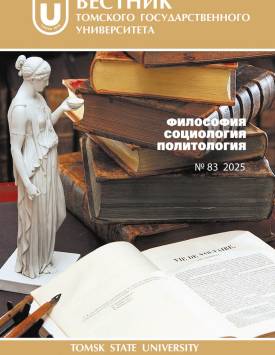Pessimistic anthropology of protestantism and the fatalism of solitude as the collapse of human existence
The article is an attempt to reconstruct the original concept of loneliness within the framework of the pessimistic anthropology of the “fathers” of Protestantism, plunging to the necessary ontological depth in order to explicate its meaning in terms of the fundamentals of human existence, since the dominant undivided Weberian model, revealed in the first part of the article, grew up on the soil of socio-religious knowledge. Therefore, it cannot express the deep (metaphysical) essence of solitude, fixing only the multidimensional spectrum of its consequences in the form of inner experiences (“inner isolation”, “spiritual solitude”, individually closed “communion of the Calvinist with his God”). Therefore, a philosophical reconstruction of the deep meaning of solitude was made, which is necessary and relevant for today. As a result of analyzing Martin Luther's teachings and John Calvin's doctrine of the “double decree”, the archetypal meaning of solitude as passive being-not-so-action, which expresses the complete collapse of human existence and the triumph of the present order, which denies the freedom of the individual as a modus of its existence, was explicated. The article pays special attention to the question of the fatalism of solitude, which is a consequence of God's decision. Therefore, the center of cognitive interest is Calvinism, which strengthened the fatalistic consequences of Lutheranism. It is shown that Calvinism converges on this ground with Stoicism, or rather is united with it in the attitude that solitude is “imposed” on man by a force fundamentally alien to his freedom and directed against him. In fact, both of these teachings urged man to courageously come to terms with it by renouncing his will, on the one hand. On the other hand, the difference between them is that in Stoicism solitude is conditioned by the rationalistic predetermination of the objective course of things, while in Calvinism it comes from the authority of God, who completely and unconditionally subjects man to solitude as a “law” (necessity, nature). For man rejected by God, solitude becomes unfreedom - a “law” from which he received “liberation” only after death, and only if he was originally predestined by God to salvation. It is noteworthy, however, that even if he received assurance of his chosenness, the “phantoms” of solitude apparently troubled his consciousness for a long time. Such is the pessimistic anthropology of Protestantism. The author also draws attention to the fact that in Calvinism the attempt to escape the fatality of hostile loneliness is declared (following Weber's exegesis) to be a tireless work for the glory of God, in the process of which man realized himself to be God's instrument, the chosen one. However, vocation, perceived by the Protestant as a sure sign of chosenness, is in fact the “freedom” to be seen only as an expression of man's submission to the order established by God's authority. Thus, in the splendor of such freedom, the value of personal existence is negligible. The author declares no conflicts of interests.
Keywords
unfreedom, fatalism, John Calvin, Martin Luther, Max Weber, Protestantism, lonelinessAuthors
| Name | Organization | |
| Lyaschenko Maxim N. | Orenburg State University | megamax82@rambler.ru |
References

Pessimistic anthropology of protestantism and the fatalism of solitude as the collapse of human existence | Tomsk State University Journal of Philosophy, Sociology and Political Science. 2025. № 83. DOI: 10.17223/1998863X/83/6
